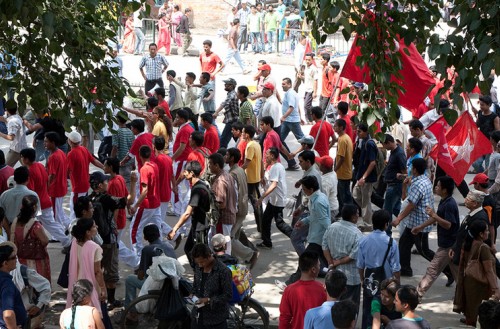Image: A protest rally against the government by Maoists from Nepal’s YCL party in 2009. (Photo: Ingmar Zahorsky, Flickr).
The problem with politics is that it involves people, and people do strange things. When development actors engage with power they often prefer to iron out the unpredictability of real politics in favour of the much neater lines of trends and social groups. We revere drivers of change studies because we can cope with the long-term, identity-based analysis of `deep’ politics.
It is harder to deal with the kind of findings that Sarah Phillips’ offers in her study of Somaliland’s conflict-free transition. She concludes that a key factor that helped its elite build peace was that they had mostly been educated at the same high school. The observable real world impact of the personal within politics would therefore seem hard to ignore – even so, development has often looked at politics as not to be confused with the roles of individuals, politicians and leaders.
A senior aid agency manager once told me: ‘You can’t design programmes around leaders.’ It is true that logical frameworks just do not work that way. Yet when we’re thinking about political settlements, the inescapable conundrum that politics involves actual politicians is one explanation for why the subject generates so much debate.
Recent workshops and a rush of new donor studies suggest that political settlement ideas are now gaining traction. One explanation for this is that political settlements thinking serves a purpose by connecting the issues of individual agency – politicians – with those of the longer term trends – the ‘deep’ politics – that development actors sometimes prefer.
To unpack this, let’s return to the question of what political settlements are; I will stick with the formulation that I first floated in 2008 in a DFID Working Paper, although I admire the nuances added by others, particularly Ed Laws.
Political settlements are simply: ‘a common understanding, usually among elites, that their interests or beliefs are served by a particular way of organising political power’. We can add that these often unarticulated understandings ‘bring about the conditions to end conflict, but … also in most states prevent violent conflict from occurring’. Since that paper emerged, Stephan Lindemann has provided examples of what this means in practice, and the World Development Report 2011 added a further dimension with its concept of ‘good enough coalitions’.
The implication is that political settlements are a product of the active or passive support of individuals who are all, at the core, unpredictable people. When crisis, war or social change cause a shift of mood, belief or interests, the outcome can be either evolution or revolution. I witnessed one such revolution in Nepal in 2007 as waves of moderate soft `monarchist’ democrats gradually came to believe they could no longer support a configuration of power that included the King; and they then came to believe that they needed to act to make this clear. A weak and contested political settlement crumbled as social constituencies seeped away, preferring to take their chances in new configurations for managing power.
Often, however, it is not mass movements that demonstrate personal agency in politics – but rather the role of those unpredictable leaders. This has led to political settlement ideas being seen as inherently ‘elitist’ in a pejorative sense; the power and agency of elites do not sit easily with our development norms.
At the political settlements workshop in Bangkok last month, the politically incorrect nature of the topic was acknowledged, but with an emphasis on exploring the actual value of the ideas. We did this by applying political settlements thinking to specific contexts, and this only strengthened the sense that the agency of leaders cannot be divorced from their relationships with those that they seek to lead. Maintaining those relationships can determine the contours of the understandings that make a settlement real.
One workshop participant challenged the group to describe how those implicit rules and understandings look in practice – the real red lines that feuding elites know cannot be crossed if even an unstable and fractious peace is to be maintained. The examples were not that hard to find in the contexts we were discussing: decades of military and landowner privileges, for instance, or the regional vetoes and identity-based rights that can delineate the political landscape of managing power.
It begged the question of whether it is the prospect of mapping the contours of these political landscapes that helps to explain renewed development interest in political settlements. Will they provide the arena for which a new generation of Political Economy Analysis has been waiting, fixing the boundaries of a problem that fits emerging analytical tools?
However, as interest in political settlements turns to ‘analysing’ and then potentially ‘strategizing’ we should first consider what we hope to achieve. The salutary work of the Africa Power and Politics programme led by David Booth suggests that the real challenge may lie in collective action problems. And if development actors were to ever hope to nudge path-dependencies: encouraging elites to move from deals-based systems (as described by Pritchett) to rules-based, then it’s far more than new analysis that would be needed. Fundamentally, the work on political settlements may further underline that traditional ideas of development influence can be ill-suited to real political contexts.
Whatever the result the idea that political settlements are objectives for influence is a likely next step. And workshop participants reflected that the political nature of development makes some impact on settlements probable anyway. But perhaps asking hard questions about intent, and whether development actors can and should take this route, is a useful step.
See more posts on political settlements by researchers, policy-makers and practitioners.










